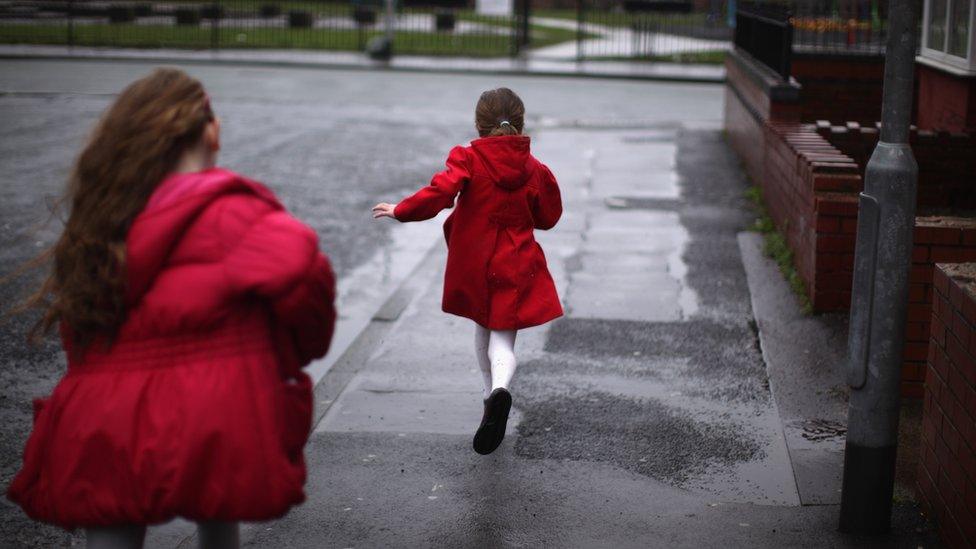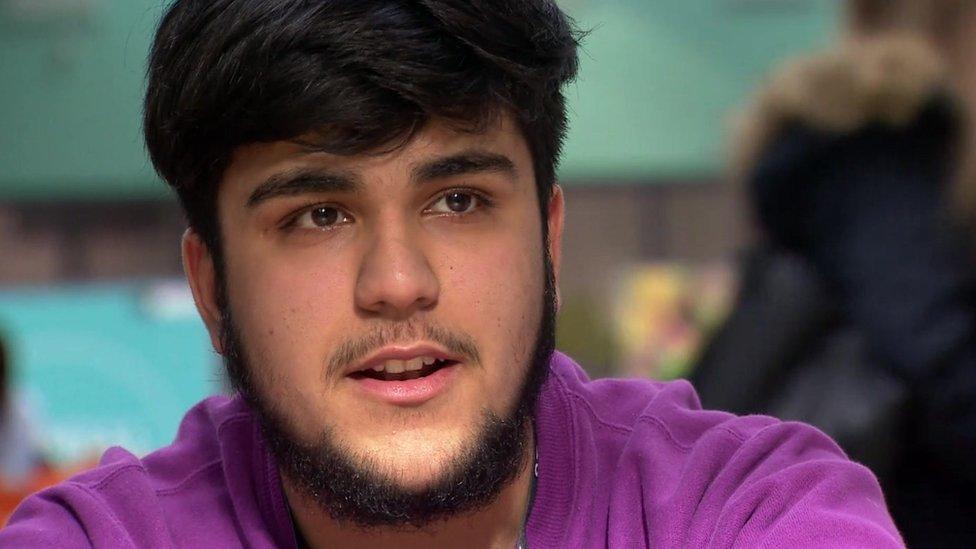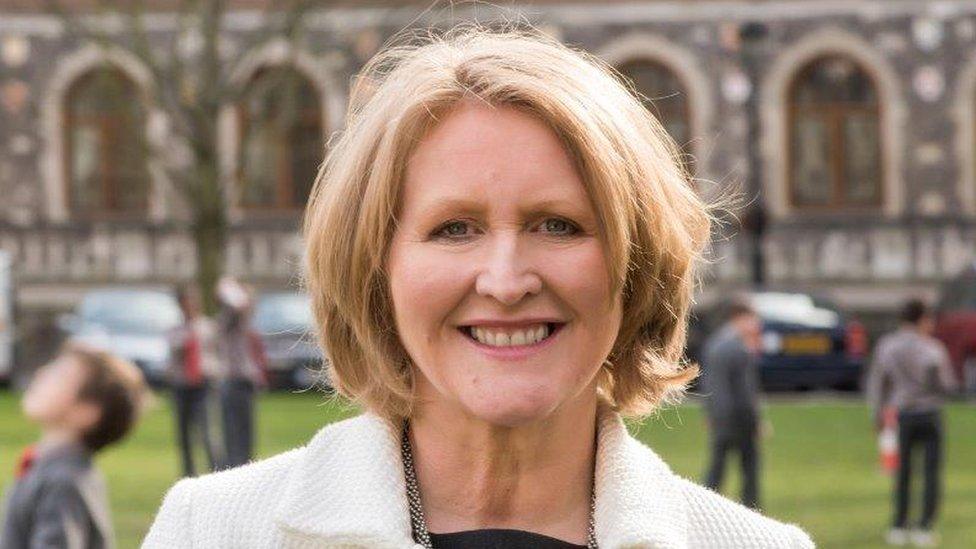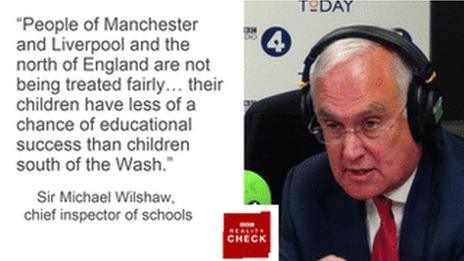Northern children 'too often left behind', says commissioner
- Published
- comments

The government says its Northern Powerhouse programme is investing billions to boost local economies
Too many children growing up in the north of England are facing the double disadvantage of entrenched deprivation and poor schools, a report warns.
England's Children's Commissioner Anne Longfield says children from poorer homes face an education gap that starts before school and widens over time.
She calls for greater investment for struggling families and a scheme to boost teacher recruitment in the North.
The government says it has committed £70m to improve schools in the region.
The commissioners' report - Growing Up North, Look North: A generation of children await the powerhouse promise - is based on 12 months of research and conversations with children, schools, businesses, councils, health professionals and charities.
It says that while many children growing up in the North are thriving, there are huge gaps between the poorest children in the North and the poorest in London.
It says a child on free school meals (FSM) living in Hackney, east London, is three times more likely to go to university than a child on FSM from Hartlepool.
And London children on FSM are 40% more likely to achieve a good maths and English GSCE than children in the North.
The commissioner's research also finds:
too many children start school far behind where they should be, often with special educational needs that have not been picked up
more than half of the secondary schools serving the North's most deprived communities are judged to be less than good
large numbers of children drop out of education before they reach the age of 18
there is a lack of confidence among children that economic regeneration will mean more jobs or opportunities
Ms Longfield is urging the government to inject more investment into the most disadvantaged areas of northern England to support children and family hubs to help families who are struggling.
She also calling for a northern schools programme to boost teacher recruitment and new partnerships between employers and schools to broaden horizons.

Teenagers' concerns
Three young people from Elliott Hudson College in Leeds told the BBC that, while they were confident about their own individual futures, there were barriers for a lot of young people in the North.
"There's way more opportunities and a lot more investment down south than there is up north," said Hafsah.
"Maybe in the future they might bring it up north, but right now it's definitely down south, concentrated down south.
How Northern students see North-South education gap
"It's really frustrating to be honest because everyone deserves equal opportunities, especially because in our country that is, like, supposed to be the main focus.
"It seems like if you're from London and a deprived area, you know you'd get a good education, regardless. Whereas if you're up North and you live in a deprived area - well you're practically living in that cycle.
"For you it's like you're deprived, your kids might be deprived unless one of you decides to up your game and walk out. But it's not fair."
Tiseana said money issues were also a barrier for a lot of youngsters.
"A lot of people I know went for the apprenticeship route because they get money and they didn't want to go to university because of the debt. I think that's a big problem.
"So I think that if you have a lot of money and you can pay for your university fees straightway then it's a lot easier for you."
Qasim added: "If you have more money, you have better opportunities to get the best and if you have quite a bit of money you can even pay for your own education.

Qasim says money plays a big part in opportunity
"If you have more money, it does lead to more doors being opened for you.
"Some of us may have part-time jobs, but if your parents have a lot more money than other parents would do, then you won't have to get a part-time job so you can focus more on education, rather having a part-time job and having to pay for stuff."

Ms Longfield said that disadvantage manifested itself in childhood in many ways, including "a lack of confidence, uncertainty and low expectation, isolated communities with narrow and poor job prospects, poor school results and poor connections to further and higher education".
She added: "Children in some areas look at new developments in the north but have little hope they might feel the benefits or have increased choices in life as a result.
"There are 3.6 million children growing up in the north. Every one of them should have the brightest future possible and best opportunities to look forward to happy, healthy and prosperous lives.
"Where they live and grow up should not be a barrier to making the most of their lives."

The Children's Commissioner wants more investment in the north of England
Sir John Townsley, chief executive of The Gorse Academies Trust which runs 10 schools in Leeds, said the eyes of central government were not on the North.
"The great interest from government remains in the south and south-east. We're barely visited, no-one's particularly interested in what we do."
Sir John said children from disadvantaged backgrounds needed high expectations of them, alongside a high quality education.
"We still have many young people who in their primary schools, in their secondary schools, are not in very strong schools and they themselves come from lives that are characterised by deprivation.
"So they suffer that double disadvantage that means it's incredibly difficult for them to move forward effectively on to rigorous programmes of study, success in A-levels, success in degrees, success in higher level apprenticeships.
"Far too many people from disadvantaged backgrounds are not really put into a position where they are challenged to a truly rigorous and dynamic academic education.
"The greatest gift that we can give to a child who has very little is not to make excuses, not to seek reasons to have them avoid doing very difficult things, but actually to make them challenged more than anyone else in any of our schools."
'More to do'
The Department for Education said five of the 12 disadvantaged areas selected as "Opportunity Areas" to receive government funding are in the north.
Since 2010, there are now 1.9 million more children in England in good or outstanding schools, it added.
A government spokesman said: "We want to create a country where everyone gets the best start in life, no matter what their background is or where they live.
"As the children's commissioner notes, many children in the north are now thriving, but there is more to do.
"Our Northern Powerhouse programme includes £3.4bn investment in projects to boost the local economy, £12m to spread good teaching practice in English and improve early literacy, and schemes that help families to support their child's education at home."
The government has also committed £70m to boost school performance in the north as part of the Northern Powerhouse Schools Strategy.
Shadow education secretary Angela Rayner said: "Where a child is born should not determine their life chances.
"By slashing funding for local services, introducing the first cuts to school budgets in a generation and denying the north the level of investment that some areas in the south can take for granted, the Tories are holding back children in the north of England"
- Published1 December 2016
